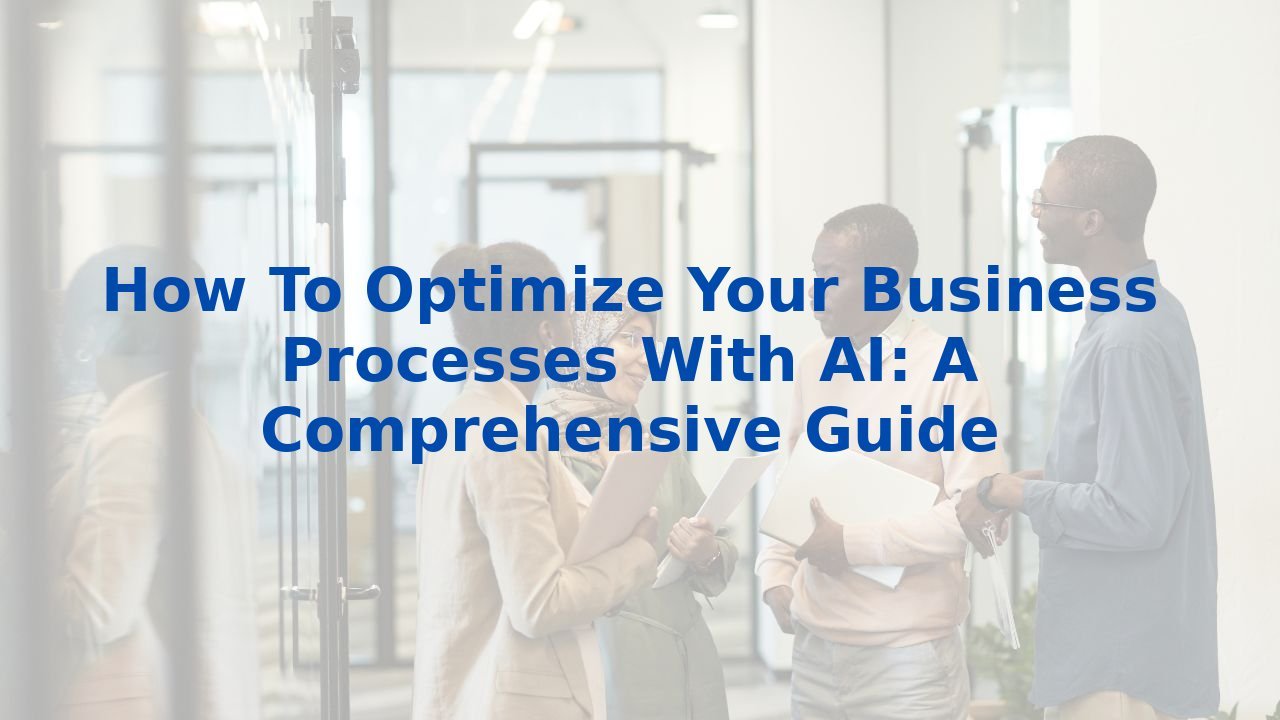How To Optimize Your Business Processes With AI: A Comprehensive Guide
How To Optimize Your Business Processes With AI: A Comprehensive Guide
Enhancing Business Processes with AI
In a world where efficiency is king, organizations are on the lookout for transformative solutions that can elevate their operations. Enter Artificial Intelligence (AI)—the game-changing technology that empowers businesses to streamline their processes, enhance productivity, and navigate the complexities of the modern market. This guide dives into how AI can optimize various business processes and the subsequent benefits that this powerful tool brings to the table.
Understanding AI Process Optimization
At its core, AI process optimization is about harnessing the power of AI and machine learning to revamp the way businesses operate. Imagine sifting through mountains of data in mere minutes, pinpointing inefficiencies, automating mundane tasks, and making insightful, data-driven decisions—this is the promise of AI.
Technologies Driving AI Optimization
The magic of AI lies within its groundbreaking technologies:
- Machine Learning: This technology learns from patterns in data to continually enhance performance without explicit programming.
- Computer Vision: By analyzing and extracting meaningful information from visual data, it opens new dimensions for interpreting data.
- Natural Language Processing (NLP): This enables devices to comprehend and manipulate human language, paving the way for intelligent data analysis.
Together, these technologies provide a framework for AI to analyze historical data, detect inefficiencies, and forecast future behaviors, thus fueling better business decisions.
Benefits of AI in Business Process Management
Integrating AI into business operations translates into a multitude of benefits:
- Faster Results & Informed Decisions: With AI’s capacity to analyze extensive datasets quickly, decision-making processes accelerate, yielding superior outcomes.
- Improved Operational Efficiency: Repetitive tasks can be automated, reducing human error and ensuring consistent operations.
- Real-Time Monitoring: AI affords organizations the ability to monitor processes dynamically, providing immediate insights to address potential obstacles.
- Predictive Analytics: By anticipating customer behavior, AI helps organizations stay one step ahead, adjusting strategies proactively.
How AI Enhances Specific Business Processes
Let’s break down how AI elevates various core business functions:
Process Discovery and Mapping
AI leverages process mining to uncover and visualize existing workflows, offering process analysts the ability to create accurate maps that reflect real-time data and changes.
Process Automation
With AI bots at work, tasks that once consumed hours—data entry, invoice matching, social media scheduling—are handled swiftly and accurately. Intelligent Document Processing (IDP) transforms unstructured data into actionable information without the need for manual intervention.
Process Improvement
AI drives continuous enhancements by presenting data-backed insights, performing root cause analysis, and offering adaptive strategies that evolve in tandem with the business landscape.
Customer Service Optimization
AI shines in customer service by scrutinizing feedback for actionable improvement and employing chatbots for basic inquiries. These bots intelligently extract essential data from customer interactions, streamlining their entry into ticketing systems for swift resolution.
Empowering Employees Through AI Training
While AI can redefine business capabilities, the success of its implementation hinges on robust employee training. Here’s why investing in training is paramount:
- Understanding AI's Potential: Employees must grasp what AI can do to integrate these technologies meaningfully into their work.
- Data Literacy: Basic skills in data analysis enable staff to engage effectively with AI insights, transforming data into strategic actions.
- Embracing Innovation: With technology evolving rapidly, a culture of adaptability will ensure that employees remain proficient amidst change.
An ongoing commitment to training not only enhances AI's effectiveness but fosters a culture where innovation thrives—a critical aspect in today’s marketplace.
Conclusion
AI represents a frontier of possibilities for businesses eager to enhance their processes and drive efficiency. By leveraging technologies such as machine learning, computer vision, and NLP, organizations can automate routine tasks, gain deep insights from data, and remain agile in the face of challenges. Yet, the journey doesn’t end with technology adoption; training employees is essential to fully unlock AI's potential. Embracing AI and committing to continuous learning empowers organizations to not only streamline their operations but to thrive successfully in an ever-changing business environment. If you're ready to embark on this journey, consider exploring comprehensive AI training options tailored to your organization’s needs.



